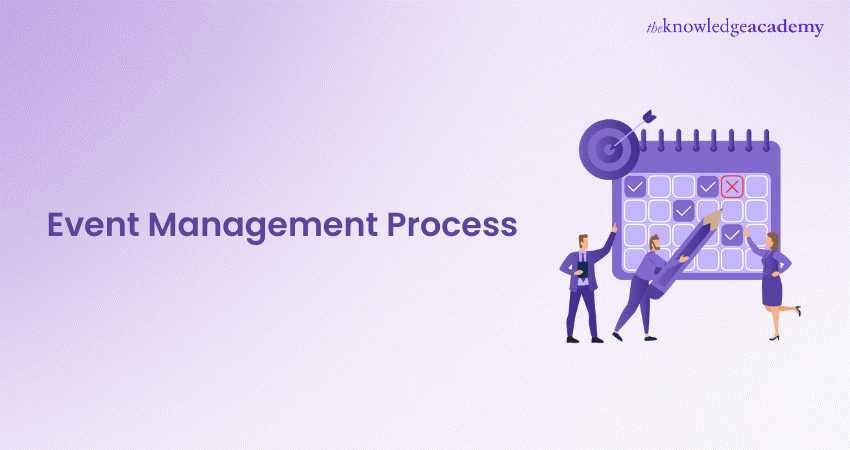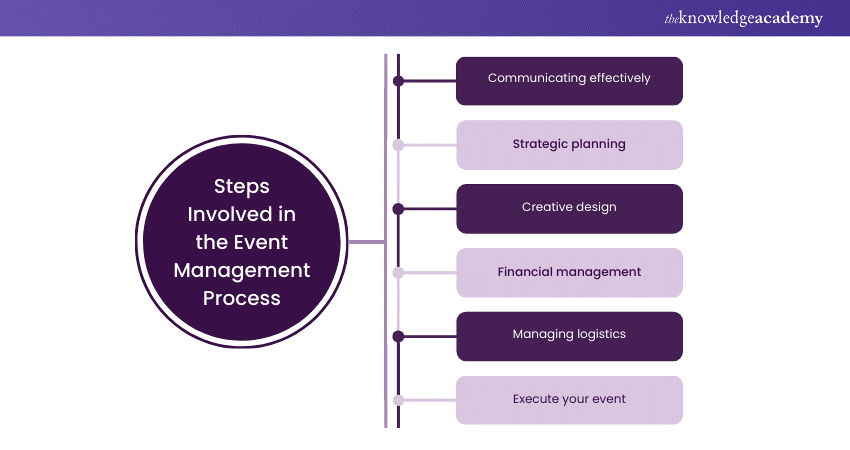We may not have the course you’re looking for. If you enquire or give us a call on +1 7204454674 and speak to our training experts, we may still be able to help with your training requirements.
Training Outcomes Within Your Budget!
We ensure quality, budget-alignment, and timely delivery by our expert instructors.

In event planning, where every detail counts and every moment is an opportunity for magic. This blog is your compass through the Event Management Process, leading you from the spark of an idea to the applause of a successful gathering. Whether you’re a seasoned pro or a curious newcomer, these insights will illuminate the path to creating events that are not just occasions but experiences to remember. So, let’s set the stage for an adventure in Event Management through this blog, where your vision comes to life and leaves guests in awe.
Table of Contents
1) What is the Event Management Process?
2) Steps Involved in the Event Management Process
a) Communicating effectively
b) Strategic planning
c) Creative design
d) Financial management
e) Managing logistics
f) Execute your event
3) Conclusion
What is the Event Management Process?
The Event Management Process is a systematic approach that helps event organisers from idea generation to execution. It encompasses all the phases and methods employed to design and execute a truly impressive, successful occasion. This process is like a blueprint that provides a detailed framework for coordination, creativity and control. It ensures that every aspect of the event is thoroughly planned and integrated, resulting in memorable event creation.
Steps Involved in the Event Management Process
The Event Management Process consists of five stages that require planning, coordination and execution to ensure the success of an event.

Communicating Effectively
Clear communication is a key factor for a successful event organisation. It goes beyond an informational exchange; it is the part where you try to get the emotions and intentions behind the information.
1) Internal Communication
Effective communication in the organisation means all employees are on the same page with regards to the goals of the team. It relies on establishing boundaries, giving feedback, and building relationships where people feel safe to say what they think and discuss their problems.
a) Team Meetings: Scheduled meetings are not only formal administrative functions but also gateways for teams to synchronise their activities, find solutions and become one.
b) Project Management Tools: Utilising project management software, one can streamline workflows, centralise documents, and track responsibilities and deadlines.
c) Feedback Loops: eating an atmosphere of open feedback promotes a culture in which team members freely express their concerns and recommendations, thereby making the event planning process more flexible and reactive.
2) External Communication
External communication is about building relationships with everyone involved in the event. This category encompasses the attendees, sponsors, vendors, and other relevant parties. It’s essential to make messages meaningful for every category and determine the appropriate ways of communicating with them.
a) Social Media Engagement: Creating a social media plan that is on the same page with the event’s theme and objectives helps to build expectations and provides a sense of belonging among possible attendees.
b) Email Campaigns: Personalised email marketing offers you the opportunity to speak to your subscribers directly, which serves very well for both notifying them and reminding them to take action.
c) Public Relations: Media outreach through press releases and media kits will assist in increasing the broadcast of the event, as well as its reliability.
Take the first step towards a thriving career in Event Management – Register for our Event Management Masterclass today!
Strategic planning
A strategic planning framework serves as a pillar to building an event. It is a step-by-step system where you imagine your targeted future and then give your goals or objectives a clear definition as well as a series of steps to success.
1) Defining objectives
The primary step in the strategic planning is to develop the goals of the event. What is your purpose? Whether it is increasing brand recognition, boosting sales, or creating a community, establishing clear goals will be the backbone of your planning.
a) SMART GOals: Objectives should be Specific, Measurable, Achievable, Relevant, and Time-bound to achieve clarity and focus.
b) Stakeholder alignment: Aligning everyone on the objectives to prevent miscommunication and conflicts in the future is important.
2) Road mapping
Road mapping involves breaking down the objectives into actionable tasks and setting deadlines for each task. A detailed roadmap will help keep the event planning on track and ensure that nothing is overlooked.
a) Task delegation: Allotting tasks based on the strengths and skills of the team members make them more efficient and satisfied in their work.
b) Milestone celebrations: The celebration of the milestones not only monitors the progress but also assists the morale and determination of the participants.
Creative design
The way an event is designed is what makes it stand out and be remembered. It is the means of creating distinctive ideas and experiences that people will be engaged with.
1) Theme development
Establishing an event theme will provide your attendees with a consistent experience. The topic should be related to the event's aim and interesting for your target group. It might be reflected through the décor, the branding, and the activities during the event.
a) Cultural relevance: Cultural relevance is one of the key elements that may increase engagement.
b) Immersive experiences: Immersing the attendants in the theme of the event may go a long way in helping them remember the event.
2) Branding and marketing
Branding and marketing are the essential aspects which you must keep in mind when planning the promotion of your event. In this respect, the logo design, the promotion and advertising materials, and a marketing strategy are to be implemented that will be attractive to attendees and will elicit excitement.
a) Consistent branding: Having the same branding style in all materials leads to the creation of the strong and distinctive identity of the event.
b) Targeted marketing: Knowing the age, location and taste of the target audience helps to create more powerful marketing tactics.
Financial Management
Handling finances is an essential task of Event Management. It requires planning, organising, controlling, and monitoring the financial resources to meet the event's goals.
1) Budgeting
Creating a budget is the first step to financial discipline. It should cover all possible incomings and outgoings with respect to the event. A detailed budget will make the event financially feasible and successful.
a) Revenue forecasting: Comprehensive budgeting and financial management decisions can be based on accurate revenue forecasts.
b) Transparent accounting: Transparent accounting practices build trust with partners and sponsors.
2) Cost control
Budget control encompasses the planning of the budget at the beginning and until the end of the planning process. It also means getting in touch with the vendors, such as the host venues and sponsorship search, among others, which are creative ways to ensure the event always stays within the budget.
a) Negotiation skills: Efficient deals with vendors can bring prices down but still maintain quality.
b) Financial cushion: Providing for a contingency fund can act as a buffer for unexpected expenses.
Managing logistics
In simple terms, logistics management is all about the systematic and precise planning and management of the product and service flows that move from source to final destination in the supply chain, being customer-driven.
1) Venue and vendor coordination
Venue is the most critical component of a successful event. The venue has to meet the theme of the event, have easy access for all guests, and not overcrowd the people. Moreover, it cannot be overemphasised that the organisers communicate with the vendors for the services and products to be provided punctually and according to the standard of the occasion.
a) Site inspections: Through proper site inspections, logistical problems can be avoided ahead of the event day.
b) Vendor contracts: Specific and detailed vendor contracts can be used to set expectations and to minimise service failures.
2) Contingency planning
No matter how well you plan, there may be some issues to really be sure of coming up unexpectedly. This is where contingency plans come in. These may involve alternatives for vendors, venues, or even extra funding.
a) Risk Assessment: Assessment of the risk level offers may provide solutions to emerging problems on time and make the contingency plan more well-directed.
b) Emergency protocols: The development of emergency protocols guarantees that the group is ready to have a prompt response to any eventuality.
Execute your event
Execution is where all the planning and preparation come to a finale. It is the final output of the planning and preparation conducted in all the processes of Event Management.
1) On-site management
On-site Management is responsible for all aspects of the event, including registration, catering and entertainment aspects. Being ready for any obstacles that may come up and ensuring the event goes as planned is crucial.
a) Leadership presence: The presence of a leader on the spot can give an impression of confidence and speediness to the staff.
b) Real-time adjustments: Timely responses are the critical factor in anticipating and solving any current challenges.
2) Post-event Evaluation
Following the event, it is necessary to evaluate its success. This entails getting comments from the participants, perusing financial reports, and determining if the event has attained its goals. The gained knowledge from this evaluation can be used to improve the upcoming events.
a) Leadership presence: A strong on-site leadership presence can instil confidence and determination in the team.
b) Real-time adjustments: Real-time modifications are pretty important to solving crises on the spot.
Advance your career as a virtual event planner with our Virtual Event Planner Masterclass – Sign up now and shape the future of online experiences!
Conclusion
In conclusion, effective Event Management hinges on meticulous planning, creative design, and robust communication. By strategically aligning objectives, managing finances, and executing logistics with precision, Event Managers can transform visions into memorable realities. Continuous evaluation and adaptation are key to refining the process, ensuring each event is a stepping stone to greater success.
Unlock your leadership potential with our Management Training – Sign up now!
Frequently Asked Questions

The 5 C’s of an event are:
1) Concept
2) Cost
3) Canvassing
4) Customising
5) Carrying out.

A SWOT analysis evaluates an event’s Strengths, Weaknesses, Opportunities, and Threats. It’s a strategic tool used to plan effectively and identify areas for improvement.

The Knowledge Academy takes global learning to new heights, offering over 30,000 online courses across 490+ locations in 220 countries. This expansive reach ensures accessibility and convenience for learners worldwide.
Alongside our diverse Online Course Catalogue, encompassing 17 major categories, we go the extra mile by providing a plethora of free educational Online Resources like News updates, Blogs, videos, webinars, and interview questions. Tailoring learning experiences further, professionals can maximise value with customisable Course Bundles of TKA.

The Knowledge Academy’s Knowledge Pass, a prepaid voucher, adds another layer of flexibility, allowing course bookings over a 12-month period. Join us on a journey where education knows no bounds.

The Knowledge Academy offers various Management Courses, including the Event Management, Problem Solving and Introduction to Management Courses. These courses cater to different skill levels, providing comprehensive insights into How to Become an Event Manager.
Our Business Skills Blogs cover a range of topics related to Management, offering valuable resources, best practices, and industry insights. Whether you are a beginner or looking to advance your Event Management skills, The Knowledge Academy's diverse courses and informative blogs have got you covered.
Upcoming Business Skills Resources Batches & Dates
Date
 Event Management Course
Event Management Course
Fri 9th Aug 2024
Fri 15th Nov 2024







 Top Rated Course
Top Rated Course



 If you wish to make any changes to your course, please
If you wish to make any changes to your course, please


